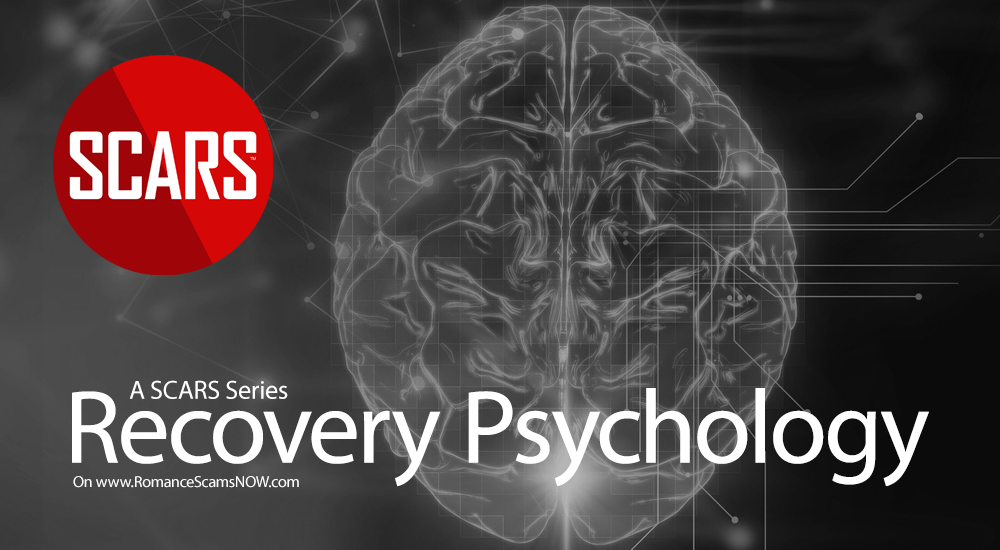
SCARS Institute’s Encyclopedia of Scams™ Published Continuously for 25 Years

It Is Important For Scam Victims To Depersonalize How They Refer To The Scammer Verbally And In Their Own Thoughts
Depersonalization of the scammer helps victims separate the crime from the emotional experience and learn to recover from it.
We all know that the scammer is a criminal who use deception and manipulation to steal money and other valuables from their victims. They are often very good at what they do and can convince even the most intelligent and savvy people to fall for their scams.
When someone is scammed, it can be a very traumatic experience. They may feel ashamed, embarrassed, and betrayed. They may also feel angry and frustrated. It is important for scam victims to understand that they are not alone and that there are resources available to help them.
Depersonalize the Scammer
One important step in the healing process for scam victims is to depersonalize the scammers.
This means to stop thinking about them as individuals with names, faces, and personalities, and to start thinking about them as a group of criminals who are motivated by greed. This means to stop thinking of them as a ‘he’ or a ‘she’ but rather just ‘they’ – learn more about that here.
Depersonalizing scammers has several important benefits:
- It can help victims to avoid blaming themselves. Scammers are very good at making their victims feel like they are stupid or gullible for falling for the scam. However, the truth is that they are neither stupid nor gullible and that anyone can be scammed, regardless of their intelligence or education level. Depersonalizing scammers can help victims see that they were not personally responsible for the scam and that they were simply the victims of a crime.
- It can help victims to avoid emotional attachment. When we think about people in terms of their names, faces, and personalities, it can be difficult to be objective about them. This can make it difficult to see the scam for what it is: a crime of opportunity. Depersonalizing scammers can help victims to be more objective and to make better decisions about how to move forward.
In addition to these benefits, depersonalizing scammers can also help to:
- Reduce the stigma associated with being a victim of fraud. Many people feel ashamed or embarrassed about being scammed. Depersonalizing the scammer can help to reduce this stigma by making it clear that anyone can be a victim of fraud, regardless of their intelligence or education level.
- Raise awareness of scams. When people talk about scams in terms of general categories, such as “tech support scams” or “romance scams,” it can help to raise awareness of these scams and make it more difficult for scammers to succeed.
- Help law enforcement to track down scammers. When law enforcement agencies have information about the types of scams that are being perpetrated and the methods that scammers are using, it can help them track down scammers and recover the victim’s money.
Depersonalization is an Important Step
Overall, the depersonalization of scammers is an important step in helping victims to heal and in preventing others from falling victim to scams.
Here are some tips for depersonalizing scammers:
- Use general terms, such as ‘criminal.’ Avoid using their name or other identifying information. Especially avoid calling them descriptive names.
- Think of them as a group, rather than as individuals. This can help you to see that they are not targeting you specifically, but that they are targeting anyone who is vulnerable. These criminals also work in groups or gangs, and most victims interact with many different criminals over the course of the crime.
- Focus on their actions, rather than their motives. It is important to remember that scammers are criminals who are motivated by greed. They do not care about you or your feelings. Never try to figure out or understand why they do anything, just understand that they victimized you.
After the Scam
If you have been scammed, please know that you are not alone. There are many resources available to help you, including SCARS support groups and counseling or therapy. Please reach out for professional competent help.
Here are some additional tips for healing from being scammed:
- Allow yourself to feel your emotions. It is normal to feel a range of emotions after being scammed, such as anger, sadness, and shame. Allow yourself to feel these emotions, but do not dwell on them. Get professional help immediately.
- Talk to someone you trust about what happened. Talking to a friend, family member, support provider, therapist, or other trusted person can help you to process your emotions and start to heal. However, be careful with other victims initially as they have their own journeys to take and it may not be helpful for you.
- Learn about scams. The more you know about scams, the better equipped you will be to protect yourself from falling victim to one in the future. You are already on the number one resource available about the topic of scams and scammers.
Depersonalizing the Scammer Helps with Trauma & Grief
Depersonalizing the scammer can help scam victims to deal with trauma and grief in a number of ways.
- First, it can help them to reduce the sense of shame and guilt that they may feel. Scammers are very good at making their victims feel like they are to blame or responsible for falling for the scam. Depersonalizing the scammer can help victims to see that they were not personally responsible for the scam, and that they were simply the victim of a crime.
- Second, it can help them to process their emotions more effectively. When we think about people in terms of their names, faces, and personalities, it can be difficult to be objective about them. This can make it difficult to see the scam for what it is: a crime of opportunity. Depersonalizing the scammer can help victims to be more objective and to make better decisions about how to move forward.
- Third, it can help them to protect themselves from further harm. Scammers are often very good at building relationships with their victims. They may use flattery, sympathy, or other tactics to gain the victim’s trust. Once the victim trusts the scammer, they are more likely to fall for future scams or to give the scammer more personal information. Depersonalizing the scammer can help the victim to see the scammer for who they are: criminals who are only interested in taking advantage of others.
- Finally, it can help them to heal from the experience. When we have a name or a face to associate with a negative experience, it can make it more difficult for us to process that experience and move forward from it. Depersonalizing the scammer can help the victim to distance themselves from the experience and to begin to heal.
Here is an example of how depersonalizing the scammer can help a victim to heal from trauma:
A woman named Sarah was scammed out of $10,000 by a romance scammer. Sarah was very upset and ashamed about being scammed. She felt like she had been stupid for falling for the scam, and she was worried about what her friends and family would think.
Sarah started seeing a therapist to help her cope with the trauma of being scammed. The therapist suggested that Sarah try to depersonalize the scammer. Sarah started to think about the scammer as a criminal, rather than as a person. She also started to focus on the scammer’s actions, rather than their motives.
Over time, Sarah started to feel better. She realized that she was not alone, and that many people fall victim to scams. She also realized that she was not personally responsible for the scam. Sarah was able to start moving on with her life.
More:
- Recovery Psychology: There Is No He Or She (romancescamsnow.com)
- 10 Steps To Breaking Free & Beginning Your Recovery (romancescamsnow.com)
- After The Scam Comes Disaster (romancescamsnow.com)
- After A Scam, No One Can Tell You How You Will React (romancescamsnow.com)
- Psychological Shock – After A Scam & In The Future (romancescamsnow.com)
- A Temporoparietal Junction (RTPJ/LTPJ) Theory Of Relationship Scams (scamsnow.com)
- Abstinence for Scam Victims – A Requirement For Healing (scamsnow.com)
- Psychology of Scams – Article Catalog (romancescamsnow.com)
-/ 30 /-
What do you think about this?
Please share your thoughts in a comment below!
Table of Contents
- Understanding an Important Step in Scam Victim Recovery
- It Is Important For Scam Victims To Depersonalize How They Refer To The Scammer Verbally And In Their Own Thoughts
- Depersonalize the Scammer
- Depersonalization is an Important Step
- After the Scam
- Depersonalizing the Scammer Helps with Trauma & Grief
- More:
LEAVE A COMMENT?
Thank you for your comment. You may receive an email to follow up. We never share your data with marketers.
Recent Comments
On Other Articles
- on Love Bombing And How Romance Scam Victims Are Forced To Feel: “I was love bombed to the point that I would do just about anything for the scammer(s). I was told…” Feb 11, 14:24
- on Dani Daniels (Kira Lee Orsag): Another Scammer’s Favorite: “You provide a valuable service! I wish more people knew about it!” Feb 10, 15:05
- on Danielle Delaunay/Danielle Genevieve – Stolen Identity/Stolen Photos – Impersonation Victim UPDATED 2024: “We highly recommend that you simply turn away form the scam and scammers, and focus on the development of a…” Feb 4, 19:47
- on The Art Of Deception: The Fundamental Principals Of Successful Deceptions – 2024: “I experienced many of the deceptive tactics that romance scammers use. I was told various stories of hardship and why…” Feb 4, 15:27
- on Danielle Delaunay/Danielle Genevieve – Stolen Identity/Stolen Photos – Impersonation Victim UPDATED 2024: “Yes, I’m in that exact situation also. “Danielle” has seriously scammed me for 3 years now. “She” (he) doesn’t know…” Feb 4, 14:58
- on An Essay on Justice and Money Recovery – 2026: “you are so right I accidentally clicked on online justice I signed an agreement for 12k upfront but cd only…” Feb 3, 08:16
- on The SCARS Institute Top 50 Celebrity Impersonation Scams – 2025: “Quora has had visits from scammers pretending to be Keanu Reeves and Paul McCartney in 2025 and 2026.” Jan 27, 17:45
- on Scam Victims Should Limit Their Exposure To Scam News & Scammer Photos: “I used to look at scammers photos all the time; however, I don’t feel the need to do it anymore.…” Jan 26, 23:19
- on After A Scam, No One Can Tell You How You Will React: “This article was very informative, my scams happened 5 years ago; however, l do remember several of those emotions and/or…” Jan 23, 17:17
- on Situational Awareness and How Trauma Makes Scam Victims Less Safe – 2024: “I need to be more observant and I am practicing situational awareness. I’m saving this article to remind me of…” Jan 21, 22:55
ARTICLE META
Important Information for New Scam Victims
- Please visit www.ScamVictimsSupport.org – a SCARS Website for New Scam Victims & Sextortion Victims
- Enroll in FREE SCARS Scam Survivor’s School now at www.SCARSeducation.org
- Please visit www.ScamPsychology.org – to more fully understand the psychological concepts involved in scams and scam victim recovery
If you are looking for local trauma counselors please visit counseling.AgainstScams.org or join SCARS for our counseling/therapy benefit: membership.AgainstScams.org
If you need to speak with someone now, you can dial 988 or find phone numbers for crisis hotlines all around the world here: www.opencounseling.com/suicide-hotlines
A Note About Labeling!
We often use the term ‘scam victim’ in our articles, but this is a convenience to help those searching for information in search engines like Google. It is just a convenience and has no deeper meaning. If you have come through such an experience, YOU are a Survivor! It was not your fault. You are not alone! Axios!
A Question of Trust
At the SCARS Institute, we invite you to do your own research on the topics we speak about and publish, Our team investigates the subject being discussed, especially when it comes to understanding the scam victims-survivors experience. You can do Google searches but in many cases, you will have to wade through scientific papers and studies. However, remember that biases and perspectives matter and influence the outcome. Regardless, we encourage you to explore these topics as thoroughly as you can for your own awareness.
Statement About Victim Blaming
SCARS Institute articles examine different aspects of the scam victim experience, as well as those who may have been secondary victims. This work focuses on understanding victimization through the science of victimology, including common psychological and behavioral responses. The purpose is to help victims and survivors understand why these crimes occurred, reduce shame and self-blame, strengthen recovery programs and victim opportunities, and lower the risk of future victimization.
At times, these discussions may sound uncomfortable, overwhelming, or may be mistaken for blame. They are not. Scam victims are never blamed. Our goal is to explain the mechanisms of deception and the human responses that scammers exploit, and the processes that occur after the scam ends, so victims can better understand what happened to them and why it felt convincing at the time, and what the path looks like going forward.
Articles that address the psychology, neurology, physiology, and other characteristics of scams and the victim experience recognize that all people share cognitive and emotional traits that can be manipulated under the right conditions. These characteristics are not flaws. They are normal human functions that criminals deliberately exploit. Victims typically have little awareness of these mechanisms while a scam is unfolding and a very limited ability to control them. Awareness often comes only after the harm has occurred.
By explaining these processes, these articles help victims make sense of their experiences, understand common post-scam reactions, and identify ways to protect themselves moving forward. This knowledge supports recovery by replacing confusion and self-blame with clarity, context, and self-compassion.
Additional educational material on these topics is available at ScamPsychology.org – ScamsNOW.com and other SCARS Institute websites.
Psychology Disclaimer:
All articles about psychology and the human brain on this website are for information & education only
The information provided in this article is intended for educational and self-help purposes only and should not be construed as a substitute for professional therapy or counseling.
While any self-help techniques outlined herein may be beneficial for scam victims seeking to recover from their experience and move towards recovery, it is important to consult with a qualified mental health professional before initiating any course of action. Each individual’s experience and needs are unique, and what works for one person may not be suitable for another.
Additionally, any approach may not be appropriate for individuals with certain pre-existing mental health conditions or trauma histories. It is advisable to seek guidance from a licensed therapist or counselor who can provide personalized support, guidance, and treatment tailored to your specific needs.
If you are experiencing significant distress or emotional difficulties related to a scam or other traumatic event, please consult your doctor or mental health provider for appropriate care and support.
Also read our SCARS Institute Statement about Professional Care for Scam Victims – click here to go to our ScamsNOW.com website.
















It took some time to fully accept the they/them pronouns. In hindsight, there were times when I had a feeling I was communicating with different people and not the same person all the time. The language would change a bit, the grammar differed. This helped me when I struggled to stop thinking of and picturing them as the person they portrayed. I would tell myself, what I’m learning through SCARS is absolutely true: it was a group of people workng in shifts who communicated with me. This helped me take a few steps forward in healing.
Since the end of my crime I have worked hard to depersonalize the scammer; I had to begin to use criminal, fraud, they, instead of personal pronouns. I have been mostly successful. More often than not I use the correct terms. On those occasions that I slip and use the personal forms I immediately associate the celebrity that was impersonated and it changes my entire perspective of what happened. Then I have to start over with depersonalizing again. This has become hard enough to repeat that it takes longer for me to slip into use of the personal pronouns.
My pig butcher scammer is a deceitful criminal who exhibits all the traits SCARS covers in these articles. It’s becoming easier to think of this despicable person as they and them as time goes by.